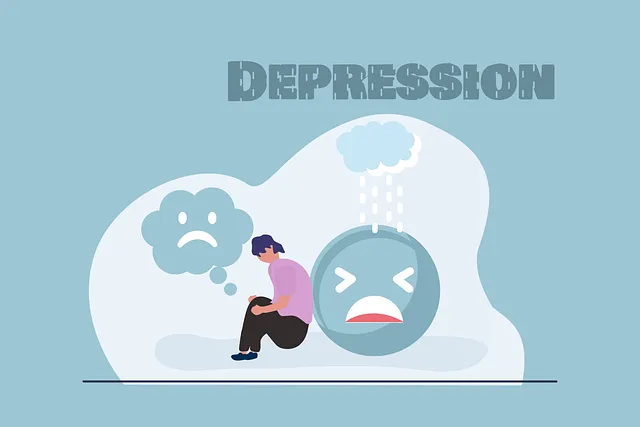The Kaiser Permanente mental health center in Littleton leads the way in specialized mental wellness coaching, driven by rising anxiety and stress-related disorders across all ages. Their holistic approach integrates evidence-based practices like CBT, mindfulness, and solutions-focused strategies to empower individuals with self-awareness and resilience. Technology enables remote access, while continuous evaluation ensures tailored interventions for improved long-term mental health support, making Kaiser Permanente Littleton a national model for mental wellness coaching education.
Mental wellness coaching programs have emerged as a crucial component in addressing the growing need for holistic healthcare. With an increasing emphasis on employee well-being, organizations like Kaiser Permanente Mental Health Center Littleton are recognizing the value of these programs. This article explores the development and implementation of effective coaching curricula, integrating evidence-based practices, leveraging technology for progress tracking, and measuring success to ensure continuous improvement, all drawing insights from Kaiser Permanente’s innovative approach.
- Understanding the Need for Mental Wellness Coaching Programs
- Designing Effective Coaching Curricula at Kaiser Permanente Mental Health Center Littleton
- Integrating Evidence-Based Practices into Coaching Sessions
- The Role of Technology in Delivering and Tracking Progress of Coaching Programs
- Measuring Success and Continuous Improvement Strategies
Understanding the Need for Mental Wellness Coaching Programs

In today’s fast-paced world, mental wellness is as crucial as physical health, and this understanding has led to a growing demand for specialized coaching programs. The need for such initiatives becomes increasingly evident when considering the rising rates of anxiety and stress-related disorders among individuals of all ages. The Kaiser Permanente mental health center in Littleton serves as a testament to this growing awareness, offering comprehensive services to cater to diverse needs. By integrating coaching programs, these centers can provide holistic care, focusing not only on treating symptoms but also empowering individuals to build resilience and enhance their overall well-being.
Mental wellness coaching programs play a pivotal role in fostering self-awareness and equipping individuals with effective coping strategies. Through personalized sessions, coaches guide clients towards improving social skills, managing stress, and developing a positive mindset. This proactive approach is particularly beneficial for those seeking Anxiety Relief, as it teaches them to navigate life’s challenges with greater ease. Moreover, such programs contribute to the development of a robust support system, which is vital for maintaining mental health in the long term.
Designing Effective Coaching Curricula at Kaiser Permanente Mental Health Center Littleton

At Kaiser Permanente Mental Health Center Littleton, designing effective coaching curricula is a multifaceted process that prioritizes holistic mental wellness. The program focuses on fostering resilience and self-esteem improvement through tailored interventions. By integrating evidence-based practices, the center ensures coaches are equipped to navigate complex client needs. Each curriculum module emphasizes practical skills for risk assessment and management, enabling mental health professionals to proactively address potential crises.
This approach leverages the expertise of experienced practitioners who collaborate on creating engaging, interactive sessions. The result is a dynamic coaching framework that not only enhances professional capabilities but also significantly contributes to clients’ overall well-being. Through continuous evaluation and refinement, Kaiser Permanente Mental Health Center Littleton remains committed to staying at the forefront of mental wellness coaching education.
Integrating Evidence-Based Practices into Coaching Sessions

Integrating evidence-based practices into coaching sessions is a cornerstone of effective mental wellness coaching programs. At centers like the Kaiser Permanente mental health center in Littleton, professionals emphasize the use of techniques backed by scientific research. This includes cognitive-behavioral therapy (CBT), mindfulness practices, and solutions-focused approaches to help clients manage stress, anxiety, and other mental health challenges. By combining these evidence-based strategies with a tailored coaching approach, programs can offer personalized support that addresses individual needs.
The design of mental health education programs should incorporate not only theoretical knowledge but also practical skills. This involves teaching empathy building strategies to coaches, enabling them to understand and connect with clients on a deeper level. Additionally, risk assessment for mental health professionals is crucial to ensure the safety and well-being of both coaches and clients during sessions. These comprehensive approaches, coupled with regular evaluation and adaptation, contribute to the overall success of mental wellness coaching programs in fostering positive mental health outcomes.
The Role of Technology in Delivering and Tracking Progress of Coaching Programs

The integration of technology has revolutionized the way mental wellness coaching programs are delivered and monitored. Online platforms and digital tools offer flexibility and accessibility, allowing coaches to reach a broader audience, including those in remote areas or with limited mobility. This is particularly beneficial for organizations like Kaiser Permanente Mental Health Center Littleton, aiming to expand their services beyond traditional clinic settings. With secure video conferencing software, coaches can conduct sessions from the comfort of their homes, providing convenient support to clients across different locations.
Moreover, technology enables precise tracking of coaching progress. Apps and software designed for mental health monitoring can record session outcomes, measure client improvements, and even predict potential relapses or setbacks. This data-driven approach ensures that coaches can tailor interventions effectively, addressing specific challenges such as mood management, anxiety relief, and other common mental health concerns. By combining the accessibility of digital tools with personalized coaching, programs like those offered by Kaiser Permanente can enhance their impact and contribute to a more comprehensive Mental Health Policy Analysis and Advocacy strategy.
Measuring Success and Continuous Improvement Strategies

Measuring success and implementing continuous improvement strategies are vital components of any comprehensive mental wellness coaching program. At the Kaiser Permanente mental health center in Littleton, for instance, progress is meticulously tracked using a multi-faceted approach that combines quantitative data with qualitative feedback. This involves regular assessments to gauge participants’ emotional well-being, stress levels, and coping mechanisms. In addition to these formal metrics, the center also values self-reported satisfaction surveys and one-on-one interviews, which provide deeper insights into individuals’ experiences and growth.
By integrating Compassion Cultivation Practices, Empathy Building Strategies, and Inner Strength Development into their coaching curriculum, the Kaiser Permanente Littleton team ensures that success extends beyond mere symptom reduction. These strategies foster a supportive environment that encourages self-acceptance, cultivates resilience, and enhances overall life satisfaction. Continuous improvement is driven by ongoing staff training, peer review, and collaboration with external experts, ensuring that the program remains dynamic and responsive to evolving mental health needs.
Mental wellness coaching programs, as exemplified by Kaiser Permanente mental health center Littleton’s innovative approach, play a pivotal role in enhancing overall well-being. By integrating evidence-based practices and leveraging technology for tracking progress, these programs offer sustainable support tailored to individual needs. Continuous improvement strategies, combined with a focus on effective curricula design, ensure that coaching sessions remain impactful and relevant. This comprehensive approach not only benefits individuals within the Kaiser Permanente community but also serves as a model for organizations worldwide seeking to prioritize mental health and foster resilient, thriving employees.






